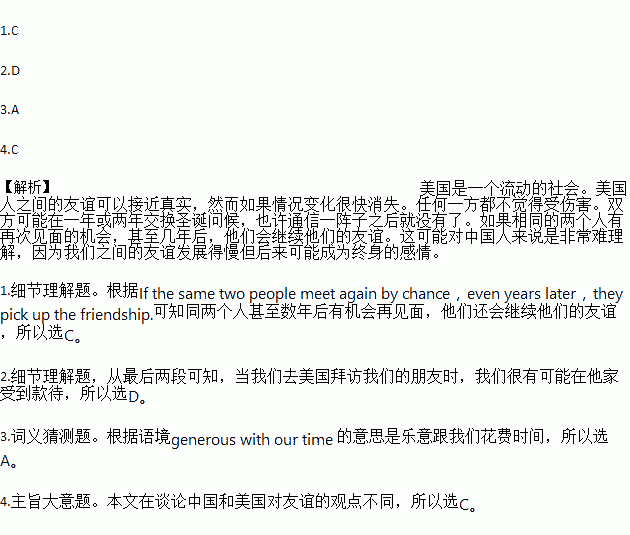题目内容
America is a mobile society. Friendships between Americans can be close and real, yet disappear soon if situations change. Neither side feels hurt by this. Both may exchange Christmas greetings for a year or two, perhaps a few letters for a while — then no more. If the same two people meet again by chance, even years later, they pick up the friendship. This can be quite difficult for us Chinese to understand, because friendships between us develop more slowly but then may become lifelong feelings, extending (延伸) sometimes deeply into both families.
Americans are ready to receive us foreigners at their homes, share their holidays, and their home life. They will enjoy welcoming us and be pleased if we accept their hospitality (好客) easily.
Another difficult point for us Chinese to understand Americans is that although they welcome us warmly in their personal everyday lives, they don't show their politeness to us if it requires a great deal of time. This is usually the opposite of the practice in our country where we may be generous with our time. Sometimes, we, as hosts, will appear at airports even in the middle of the night to meet a friend. We may take days off to act as guides to our foreign friends. The Americans, however, express their welcome usually at homes, but truly can not manage the time to do a great deal with a visitor outside their daily routine. They will probably expect us to get ourselves from the airport to our own hotel by bus. And they expect that we will phone them from there. Once we arrive at their homes, the welcome will be full, warm and real. We will find ourselves treated hospitably.
For the Americans, it is often considered more friendly to invite a friend to their homes than to go to restaurants, except for purely business matters. So accept their hospitality at home!
1.Which of the following statements is TRUE according to the passage?
A. Friendships between Americans usually extend deeply into their families.
B. Friendships between Americans usually last for all their lives.
C. Americans will continue their friendships again even after a long break.
D. Americans always show their warmth even if they are very busy.
2.From the last two paragraphs we can learn that when we arrive in America to visit an American friend, we will probably be ______.
A. warmly welcomed at the airport B. offered a ride to his home
C. treated to dinner in a restaurant D. treated hospitably at his home
3.The underlined words “generous with our time” in Paragraph 3 probably mean________.
A. willing to spend time B. serious with time
C. strict with time D. careful with time
4.A suitable title for this passage would probably be “______”.
A. Friendships between Chinese
B. Friendships between Americans
C. Americans’ and Chinese’s views of friendships
D. Americans’ hospitality

